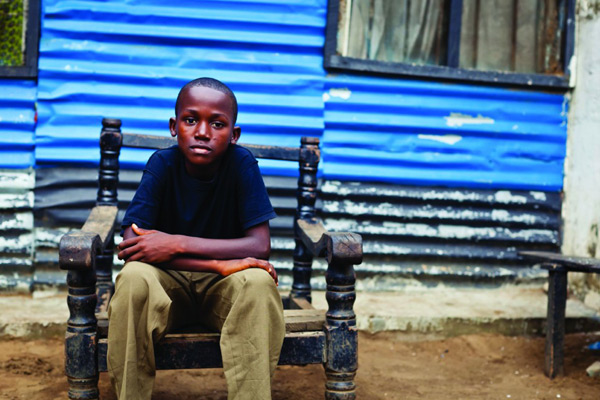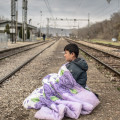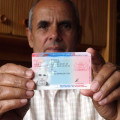Guardianship for unaccompanied minors in the Netherlands: the role of Nidos
Political framework and general context
In the Netherlands guardianship is arranged by a specific organization, Nidos, which is responsible for all unaccompanied minor asylum seekers (UMA). Nidos is an NGO, financed by the Ministry of Justice, with an independent board. At the beginning of the nineties, the Dutch Ministry of Justice appointed Nidos as a specialized guardianship institution for UMAs so that a national organization could function as a point of reference and could guarantee continuity in the counselling. Another consideration was that as a result of this expertise could be developed for such a specific group. In 2014 more than 1,500 new guardianship-measures were granted. In the years before this there were much fewer. This brought the total number of guardianships on December 31st 2014 to around 2,600.
Organization of guardianship for unaccompanied minor asylum seekers
Responsibility of care
The responsibility for the day-to-day care of unaccompanied minor asylum seekers lies in part with youth care organizations or with the foster parents. As a guardian, Nidos is the supervisor.
Reception in the Netherlands: Nidos will accommodate the UMAs younger than 15 years old in foster homes. The UMAs between 15 and 18 will be accommodated in a special Centre for UMAs near the Application Centre (AC) for the first period of up to three months. During this period the minors will be observed by juvenile protectors and mentors, after which time they will decide together whether continuing accommodation is the most suitable option for the UMA in question. Neither the age nor the fact that there is or isn’t a residence permit are the main criteria in this, but rather it is the UMA’s development and maturity. The next suitable stage of reception can be reception into a foster family, Children Living Groups, Small Living Units or a UMA-campus.
The Children Living Groups are designated for children aged up to and including 15. In the residential units there is a 24-hour supervision. These units also host small groups of children who belong together and in which the eldest is considered the head of the family but for whom it would be too much to take care of the other children. The Small Living Units are designated for young people aged 15 to18, usually of varying nationalities.
In a small residential unit, four young people stay under supervision. For every four young people a counsellor is present 28.5 hours a week who counsels and helps them.
Nidos has its own pool of foster families at its disposal, into which it can place its pupils. A number of guardians have been relieved of other obligations in order to recruit and guide families. There are currently 1,200 children staying in foster families. This type of accommodation is described more in depth later in the article.
Responsibility for guardianship
The guardianship of unaccompanied minor asylum seekers is based on one of the basic laws of the Netherlands: The Dutch Civil Code. This Code states that all minors residing in the Netherlands must be provided with legal guardianship. All minors, Dutch or foreign, must have a legal guardian. Usually this is a parent, and in the absence of a parent, the government must ensure that a guardian is appointed. Consequently, this also applies to UMAs.
A guardian must therefore be appointed. This takes place by means of legal proceedings resulting in appointing a guardian by the court. Guardianship is therefore always a result of a judicial decision. Usually the judge appoints Nidos as guardian.
The Dutch authorities have recognized Nidos as a guardianship and family guardianship (supervision) institution. The guardianship is assigned to the foundation. The guardianship is actually carried out by professionals, so-called juvenile protectors, employed by Nidos. Every recognized institution functions under the Youth Care Act. This means that certain quality requirements must be met by the organization, such as the procedure (the tasks that have to be carried out and how this should be done), the recruitment of professionals for the counselling of minors, the right of complaint and the accounting for methodical work by means of file creation. The task of Nidos is tested against the Civil Code and the Youth Care Act. A governmental body supervises its execution: the Inspection for the Youth Protection supervises the guardianship institutions.
Guardian: position in practice
Guardianship means that Nidos exercises the assigned lawful authority of supervising these young people on their way to adulthood and the promotion of the interests of these young people. The guardian provides long-term, continued care and is responsible for the mental and physical well-being of the child and the furtherance of the development of his/her personality. The guardianship counselling aims for independence at the age of majority (18) since this is, according to the law, the age at which the guardianship ends.
The juvenile protectors must have graduated from the social academy. A juvenile protector accompanies 21 minors when he or she is working full time. This means that he or she will see a pupil on average at least once a month. Where necessary courses and studies on special subjects will be organized by Nidos to support the juvenile protection.
As a guardian Nidos is responsible for the education and care of UMAs. The juvenile law determines how to handle children. This means that, as a guardian, Nidos has to promote the interests of the ward: his rights are being protected. In addition, Nidos guides the pupil in such a way that he or she will be independent when they come of age. He or she will be able to manage in Dutch society, which has completely different norms and values than the youngsters learned at home. Pupils will know where to get something and Nidos guides them in building their own network. In other words: Nidos teaches them to look after themselves. With the guardianship, the youngsters are offered a perspective: it is in the interest of youngsters to obtain clarity about their position quickly: will they be able to stay in the Netherlands or will they have to leave? The perspective on whether the UMA can stay or not directs the way UMAs are accompanied by Nidos. All minors, including UMAs, are of school-age until the age of 16 (when they are of partially school-age). All UMAs have the same access to education as Dutch minors, depending on their knowledge of the Dutch language. UMAs that want to go back to their country of origin receive a special education that is apt/suitable for their stay there.
The objectives of the guardianship can be divided into judicial and pedagogic objectives. Children up to the age of 18 are legally considered to be dependent and without the legal capacity to act. Consequently, they cannot and are not allowed by the legislator to live without custody. The pedagogic task of guardianship is to teach children and young people to participate actively and productively in social relationships within the society of which they are currently part of.
From these two objectives the domains in which the guardian must be methodically active can be concluded. The domains are:
- Promotion of interests
- Education and care
- Identification and prevention with a view to preventing abuse, preventing disappearances and preventing an existence in illegality.
Method[1]
Nidos has a special guardianship method for UMAs that discusses problems relating to return and various forms of reception. Nidos has always aimed at dialogue-oriented actions, in which the client’s contacts form the basis of the procedure. The guardianship method supports this. Nidos works with the clients and with the “plan on the table” on the four steps that the method consists of. Based on this, an “Action Plan” is drawn up. This is written in the six weeks following the start of the guardianship.
After the Action Plan has been drawn up, Nidos works on the objectives throughout the year as the progress is continuously being evaluated. During each contact Nidos works consciously on an operational objective. At the end of the year an obligatory evaluation takes place to examine the development of the young person.
Foster care for unaccompanied minors
Around 40% (approximately 1,200 children) of the unaccompanied minors in the Netherlands live in foster care. One of the tasks of the guardian is to ensure a secure lodging and living situation. From Nidos’ point of view, the most suitable form of living for unaccompanied minors is provided by a family. This vision is supported by the international legal framework as well as research by Groningen University[2]. Client satisfaction research carried out among unaccompanied minors by Nidos also supports this: the minors living in families have reported being more satisfied with their lives than those living in other forms of reception.
In the field of foster care, unaccompanied minors form a specific group that requires a specific vision and interpretation of foster care. Because of the different backgrounds of these youngsters, Nidos favors reception in families connected with or close to their own ethnic background. These family connections provide the minors with a secure basis from which they can return to their country of origin or integrate into Dutch society, while preserving their own cultural identity. In many cases, the minors are familiar with the idea of living with next of kin because, in most of the countries of origin, it is customary for family members to receive and educate children whose parents are absent.
There is a crucial difference between the general Dutch foster care system, which focuses on the care of a youngster who has a personal (development) problem, and the fact that unaccompanied minors simply need safe and suitable reception. For this reason Nidos has developed its own pool of foster care families of many different nationalities, called the “reception pool”, in which Nidos can place its charges. However, this means that unaccompanied minors with severe problems cannot be accommodated using this form of foster care and instead will be referred to the general youth care system.
A nationwide team dedicated to Reception and Living in Families (RLF team) within Nidos is responsible for recruiting, screening, matching and supporting the foster families in the reception pool, which consists of 417 families, as well as an additional 778 kinship/network families that foster children who are related to them and who are also under Nidos’ guardianship. The major task in supporting the families is assigned to the guardians who visit the children and the families monthly. A reception family (both pool families and kinship/network families) receives a daily allowance linked to the age of the unaccompanied minor. For a 16-17 year old this is around 600 euros a month.
Recruitment of families
As the nationalities of the unaccompanied minors are liable to change, the RLF team is constantly searching for families with the specific backgrounds needed at that time. For this reason there was an extra focus on the recruitment of Afghan families in 2012 and Syrian families in 2014. Differentiation in reception is also regarded as an important issue in order to be able to provide (more complex) family systems such as siblings or teenage mums with appropriate (cultural) reception within families.
The RLF team strives to make people responsible for their compatriot children and asks them to help in the search for new foster families. The team tries to get families it is already working with to get further involved and take on the responsibility of other children. The team also gets in touch with foundations from within the various communities; it visits them, explains to them the challenges and asks them to help. Raising public awareness on community TV in the languages of the target groups has also been beneficial.
In the team’s experience, it is possible to find enough families through persistence. It is essential not to give up, to penetrate deep into the different ethnic societies and to really understand the background of potential families. To gain their confidence and demonstrate that the team is from a reliable organization has proved to be of great importance. It is also important to show people that they can benefit from becoming a foster family as it can give them meaning and significance, both in their own community and in Dutch society.
Guidance
When in contact with families, it is very important to be respectful and take an interest in their background. Nidos asks foster families that already work for the organization to tell others about it. It has also proved to be very important to ensure that foster families feel “heard”. In order to gain the opinions of foster parents and minors living with them on the care provided by Nidos and the RLF team, 72 Reception and living in families, Nidos started organizing World Cafés as a form of client participation in 2012. There, people can get to know each other socially and share experiences, providing insight into what clients regard as important in terms of the way care is offered and how it can be improved. The World Cafes have highlighted points of interest such as supporting the contact with absent family members, preparing for the moment the minor turns 18, how to deal with pocket money, the importance of a confidant for each minor and the importance of being a member of a sports club. The results are being used as feedback for the RLF team on the support of the minors and the reception families alike, and for improvement of the methodology that Nidos is using for the RLF team.
The methodology that is used by the RLF team was officially outlined in summer 2010 in a handbook and has since been further developed, for example in the field of safety. The RLF team has been trained to work using this methodology.
Nidos Communication Team
For further information about the European project with which Nidos is involved followed the link www.engi.eu.
[1] Reference is made to the document “Working with the unaccompanied child”. This report contents an in depth description of the method used by Nidos to assist an unaccompanied minor. This report can be found via: http://www.connectproject.eu/nld.html
[2] The University of Groningen is carrying out research on several subjects relating unaccompanied minors. A specific department is responsible for this research, namely: the “study centre for children, migration and law”. Further information on this centre can be found via http://www.rug.nl/research/study-centre-for-children-migration-and-law/




